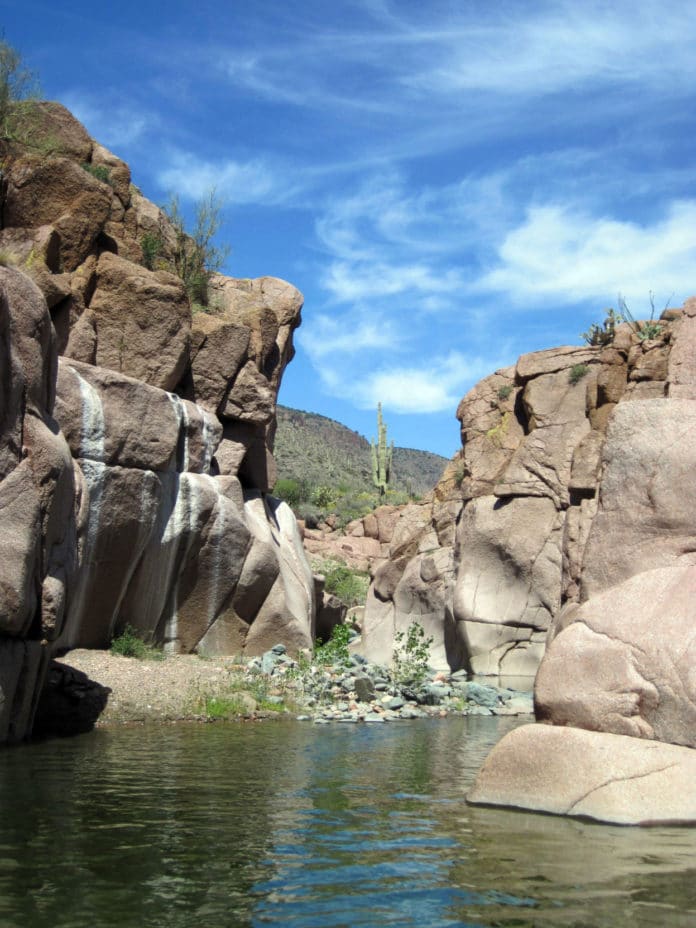THE SONORAN DESERT, Ariz. – There’s a town meeting tonight in a town once home to fertile copper mines. They played out years ago but faith still beats in the hearts and minds of the residents – those who did not move in the hope of finding other jobs – that copper mining will make a comeback.
An investor has bought the old and closed hotel in town and actually added on in anticipation of the next copper boom.
A famous food writer and editor who is also a world-class chef came back to the town after more than 40 years plying her trade in New York City to open a restaurant and “give back” to the town where she was raised.
So, even as the Arizona sun hastens the demise of peeling paint on vacant buildings baking in the 110-degree September heat, there is life afoot.
A visitor at first glance feels the isolation and desolation of the small town, one reminiscent of so many that dot the vastness of Texas and America. What do folks do here? How do they live? Where’s the movie theater? And how to get a Carmel Macchiato Latte?
But at second glance and then a third, he sees that they still rent movies in VHS and DVD at the one grocery store in town. There’s a coffee shop and deli that boasts most of the coffee drinks you can get at a Starbucks, along with homemade sandwiches, coleslaw, and salads tossed with greens picked that morning.
And then he realizes that when you look skyward you see a town surrounded by majestic mountains, their hard edges wrapped in various hues of deep reds that come alive in startling sunlight in the morning and bathe in luminous beauty in night’s descent.
And the cacti. Oh, the cacti. This incredible and hardy plant rises everywhere in a multitude of varieties that somehow stand as symbols of every part of America where people learn to adapt, to survive, and yes, even thrive.
Nearby is the 3 million-acre Tonto National Forest with thousands of miles of trails where you can hike and even go horseback to explore and camp and watch and listen. Out here you can hear life and nature without the hum and rattle and roar of trucks and cars.
And then there is the magnificent Boyce-Thompson Arboretum, a 300-acre adventureland featuring more than 200 varieties of birds and 72 terrestrial species. It is the culmination of a vision by its founder to preserve and showcase the plants, flora and fauna of the Southwest. It’s also home to plants and flowers of Australia and South America and Africa. There are birds that migrate there and fruit on trees you would not expect to find in Arizona and books on how to use the luscious juice of the prickly pear for cooking and drinking.
Arboretum staff members – some have worked there for over 20 years – will eagerly explain the symbiosis between human life and nature and the interconnectedness of it all.
And then there’s the town meeting. Some 30 to 40 citizens opted to bypass the Denver Broncos’ season-opening game against San Diego on Monday Night Football so they could gather at the town hall to munch on homemade cookies and meet with members of the city council, the U.S. Forest Service, and a local copper mining company.
They wanted to talk about roads and trails and express concerns about the conflict that can occur when government sets out to make things better but runs the risk of infringing on the natural treasures that make their small town special.
Other concerns are more poignant and in your face. In the vastness of this desert land and the national forest, folks decide to practice target shooting wherever and whenever.
Who will police the safety of naturalists and hikers who want to walk and hike and revel in the quiet of the forests and mountains?
It’s difficult, says a member of the government panel.
“You know,” he says in understatement that you have to smile at, “there are those folks who just want to take an old refrigerator or television out there and shoot at it.”
Well, okay. There you have it.
Take what you want from this, if anything, but scenes such as these on a couple of lazy days in September tell me that the noisy, volatile world we watch on television and read about in newspapers – life as reported and seen by those in Washington, D.C. and other media hotbeds, is not the world that dominates life in most of America.
Much of this country is still rural and inhabited by people who do one simple thing. They live there.
They live their lives and do what they can to make life better, for themselves and for those who will follow them.
Richard Connor is president and publisher of the Fort Worth Business Press. Contact him at rconnor@bizpress.net






